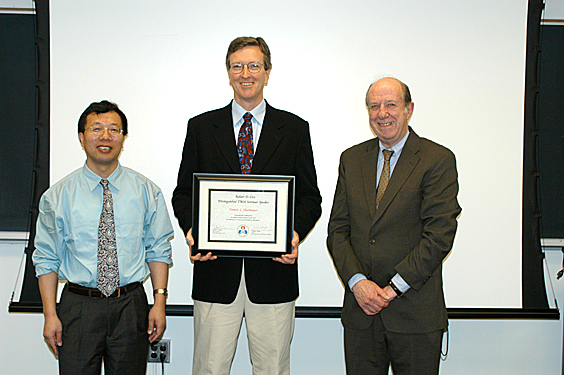To honor our Distinguished Professor Emeritus Robert D. Cess, ITPA will invite a distinguished TAOS speaker each year named after him. We are pleased to announce that this year’s Robert. D. Cess Distinguished TAOS seminar speaker was Dr. Dennis L. Hartmann who will give the TAOS seminar Friday, April 23, 2004.
Dr. Dennis Hartmann is a world renowned atmospheric scientist. He is currently professor and chairman of the department of atmospheric sciences in the university of Washington. He obtained his Ph.D. degree from Princeton University in 1975. A fellow of the American Meteorological Society, American Association for the Advancement of Science, and American Geophysical Union, Dennis also served on many government panels and committees on climate issues.
Dr. Hartmann’s seminar is titled: Tropical Cloud-Climate Feedback Processes and the Fixed Anvil Temperature Hypothesis.
Absrtract: Tropical convective anvil clouds detrain preferentially near 200 hPa. It is argued here that this occurs because clear-sky radiative cooling decreases rapidly near 200 hPa. This rapid decline of clear-sky longwave cooling occurs since radiative emission from water vapor becomes inefficient above 200 hPa. The emission from water vapor is less important than the emission from CO2 when the saturation vapor pressure is so very low at thetemperatures above 200 hPa. This suggests that the temperature at the detrainment level, and consequently the emission temperature of tropical anvil clouds, will remain constant during climate change. This constraint has very important implications for the potential role of tropical convective clouds in climate feedback, since it means that the emission temperatures of tropical anvil clouds and uppertropospheric water vapor are essentially independent of the surface temperature, so long as the tropopause is colder than the temperature where emission from water vapor becomes relatively small.





